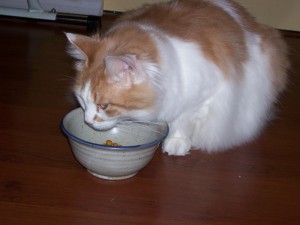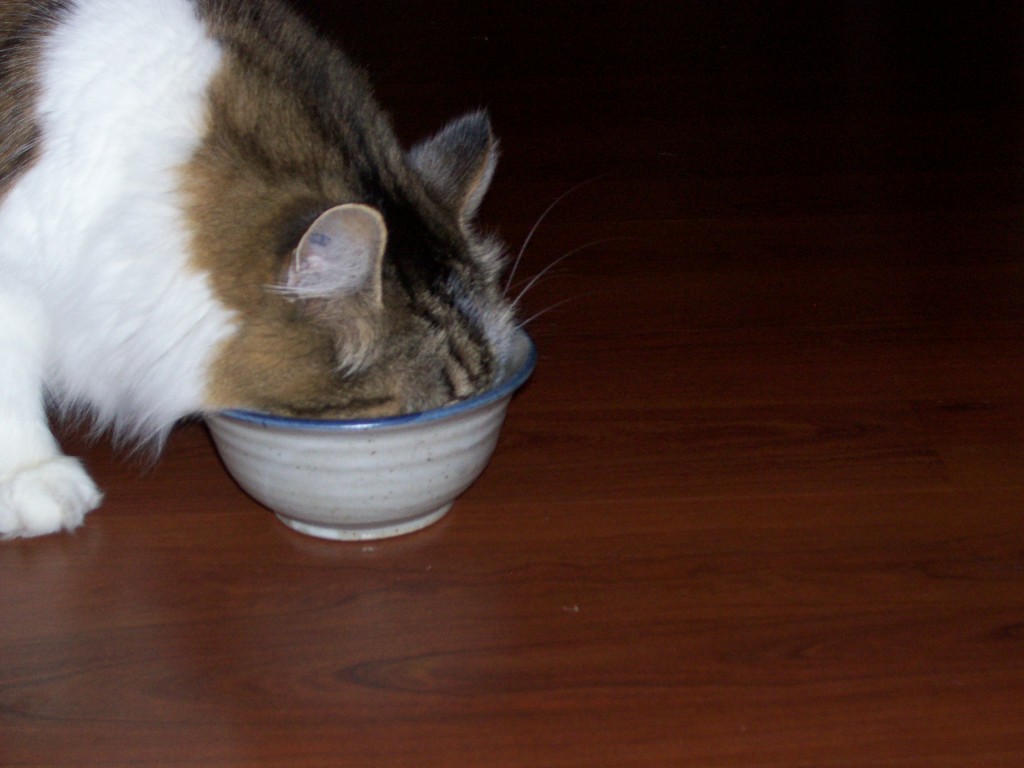Gluten and Food Sensitivities
Archive ∙ Back to Island Voices
December 2013
 At the recent North American Veterinary Conference held in Florida, Dr. John Symes spoke about pet food and the impact of gluten. The question he raised was whether expensive pet food provided high quality nutrition. The answer will surprise you.
At the recent North American Veterinary Conference held in Florida, Dr. John Symes spoke about pet food and the impact of gluten. The question he raised was whether expensive pet food provided high quality nutrition. The answer will surprise you.
He thinks that many of the ingredients are unnatural for animals, specifically wheat, barley, corn, rice, potatoes, and soy. Dogs and cats would never eat these crops in the wild. These grains cause major problems.
Back in the 1980s, veterinarians were taught that only Irish Setters had a gluten intolerance. Celiac disease, just a few years ago, was considered a rare disease affecting less than 1 in 5000 Americans. But, it is being diagnosed in 1 in 100 people in the United Kingdom.
Gluten intolerance can be a contributing factor in allergies, inflammatory bowel disease, cancer, immune-mediated diseases, diabetes, as well as arthritis. And, now we think that it affects 1 in 30 people. This is a concern when wheat alone makes up for 30% of the calories in the standard American diet and it’s one of the primary ingredients in pet foods.
In celiac disease, gluten is the culprit. Gluten is a glycoprotein comprised of glutelins and prolamines (of which gliadin is the major component). Gluten sticks to the villi – the tiny outpouchings in the gut wall. When antibodies come to destroy the gliadin, it damages the villi. This only occurs in certain individuals.
Once the villi are damaged, the gut becomes permeable, allowing chemicals to pass through when they shouldn’t. Lectins are allowed through and they are pro-inflammatory. These come from gluten grains, soy and legumes, corn, as well as nightshades (tomatoes, potatoes, and peppers).
This can cause “leaky gut syndrome” where permeability of the gut in increased yet the body is unable to absorb many important nutrients. Some of the nutrients that are missed are calcium, iron, iodine, B complex vitamins, and many trace minerals. Once we understand this, we can see why certain diseases occur. Think of diseases like osteoporosis, iron deficiency anemia, thyroid disorders, enzyme deficiencies, and immune incompetence. The health of every cell is compromised by not absorbing these nutrients.
Thirty years ago, most pet foods had corn as the carbohydrate source. A few dogs had problems with allergies, immune-mediated diseases, and early cancer-relayed deaths. Some particular breeds had more problems, such Westies and Golden Retrievers.
Then, there was excess wheat available. To save money, manufacturers substituted wheat for the corn. While most switched, Hill’s did not. Their food (with corn) tended to produce less allergies, less skin problem, smaller stools, and less intestinal upsets. But, corn was not perfect. It was still causing problems.
Though the pet food industry now uses less wheat, corn, and soy, they are using barley and rye, two other gluten grains. This can still cause intestinal damage. As our understanding of gluten intolerance increases, the truth will emerge. We can control the health destiny of our pets.

At our hospital, we can use testing (applied kinesiology) to determine if food is the issue (if a pet can tolerate the ingredients). And, specifically, cats should never be fed foods containing cereal grains. Check out our website for information on feeding cats.


